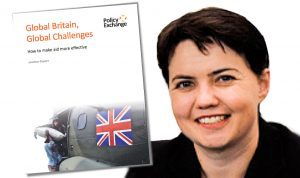 The UK should maintain its commitment to spend 0.7% of national income on overseas aid, as part of a wider approach to create a truly Global Britain
The UK should maintain its commitment to spend 0.7% of national income on overseas aid, as part of a wider approach to create a truly Global Britain- In order to maximise the impact of our overseas aid, the Government should spend more on global public goods like R&D and create a new Office for Aid Effectiveness
- Britain should become a global champion of free trade to help developing countries
Policy Exchange today publishes ‘Global Britain, Global Challenges: How to make aid more effective’. The report makes a strong case for the importance of overseas aid and supports the Government’s commitment to spending 0.7 per cent of national income on aid. However, it also argues strongly that aid can and should be spent more effectively and that the development community should embrace trade and capitalism as vital to reducing poverty and disease.
The report has a forward by Scottish Conservative leader Ruth Davidson, in which she says:
“As this report argues, there is a strong centre-right case for putting overseas aid at the centre of a Global Britain, working alongside our commitments to strong defence and becoming a global champion for free trade. To defeat poverty, we will need to support both aid and trade, markets and global public goods – not create an artificial dichotomy between them.”
Policy Exchange’s Programme Director Richard Howard said:
“While we support the Government’s commitment to maintaining spending on overseas aid, the Government should be mindful that it’s not just the size of your aid budget but what you do with it that counts.
“There are clear synergies between Britain’s national interest and the wider global interest in tackling global challenges, supporting hard and soft power, accelerating innovation and encouraging free trade. In recent years, too many international NGOs have become involved with domestic politics or pushed misleading narratives about global inequality. Elements of the NGO community still fail to recognise that capitalism and free trade are part of the answer, not part of the problem. Free trade is vital to alleviating global poverty.
“Compared to other countries, the British aid budget is reasonably well targeted on countries with high levels of poverty or disease. However, there is still more we can do to identify the most important global challenges or cost-effective interventions. British aid should focus more on global public goods such as liberalising trade or investing in R&D.”
The report proposes four principles to ensure that resources are spent most effectively and go still further to help Britain take a leading role in tackling the world’s most important challenges:
- Maintain the commitment to a Global Britain
- With aid and defence spending levels guaranteed, there should be a greater focus on achieving outcomes rather than cash spent.
- The Government should commission a short-term update to the 2015 Aid Strategy. This should take account of post-Brexit circumstances, and look at a wider development strategy which includes trade, agriculture and security.
- Create a more efficient and innovative aid budget
- The Government should create a new Office for Aid Effectiveness to collate and commission evidence. Working with DFID, it should ensure that all major new programmes are at least as effective as cash transfers.
- Over the medium term, the Government should substantially raise the proportion of the ODA budget going to Global Public Goods like public health or R&D.
- Stand up for democracy, the rule of law and a free press
- There is a strong correlation between economic development and open institutions such as the rule of law, a free press and fair elections. While aid is increasingly likely to be concentrated in fragile states, the UK should be careful not to prop up authoritarian states or enable predatory elites.
- New due diligence criteria for engagement should be adopted to ensure that funding and recognition is not given to those whose views and practices are antithetical to democratic principles and the rule of law.
- Reduce trade barriers with the developing world and act as a global champion of free trade
- Elements of the NGO community still fail to recognise that aid and free trade are complementary ways to alleviate global poverty. The UK should go beyond the EU’s duty-free and quota-free approach for developing countries.
- The Government should substantially reform the Common Agricultural Policy after 2020, creating a new British Agricultural and Rural Policy that focuses on supporting the local environment rather than food production or protectionism.
This report will be followed up by a second part, to be published in the autumn, which will explore how British R&D can help tackle global challenges, and which interventions are the most crucial.


 The UK should maintain its commitment to spend 0.7% of national income on overseas aid, as part of a wider approach to create a truly Global Britain
The UK should maintain its commitment to spend 0.7% of national income on overseas aid, as part of a wider approach to create a truly Global Britain